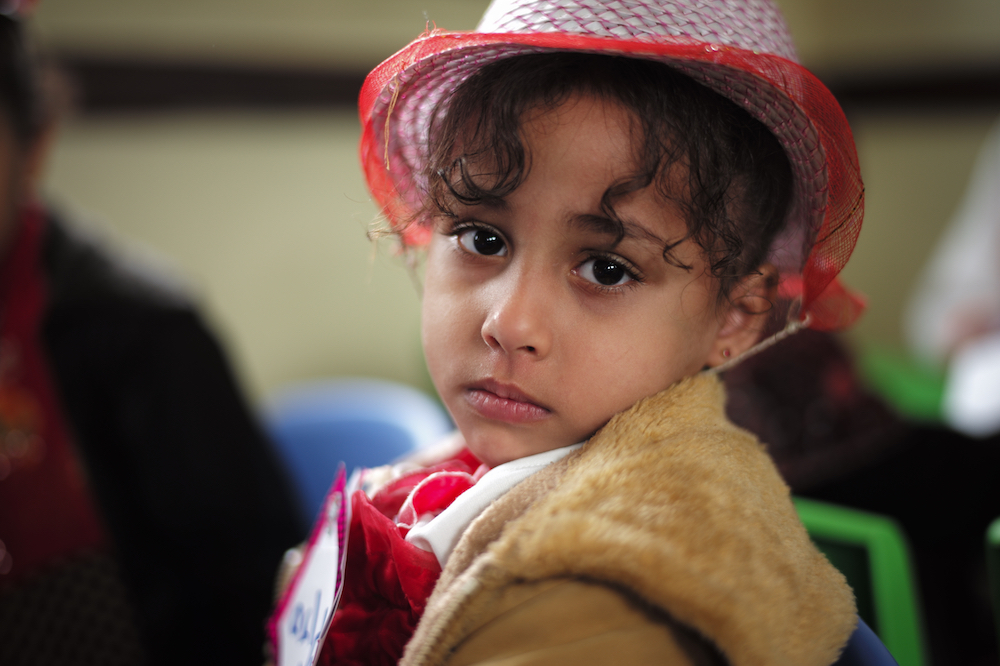
Toxic stress spells disaster for many children in Syria and other conflict countries
Child soldiers, Children in conflicts, Early childhood development, Education in emergencies, Refugees and internally displaced people, Safe schools
Periods of prolonged fear or abuse could have devastating physical and psychological consequences for children in later life.
In a war zone, toxic stress can be as much of an enemy for young children as armed fighters or bombs.
When exposed to periods of prolonged fear, chronic neglect or abuse, poverty and hunger, a child’s “stress response” will go into overdrive – with devastating consequences.
A young child’s brain architecture begins to change, leading to physical and mental health issues later on in life.
Researchers at Harvard University found that the more adverse the experiences in childhood, the greater the likelihood of developmental delays and later health problems, including heart disease, diabetes, substance abuse, and depression.
That spells potential disaster for young children growing up in war-torn countries such as Syria, Palestine, Yemen and Iraq.
A child protection report this week by UNICEF and other agencies said: “The relentless violence and dire humanitarian situation in Syria are having a devastating impact on the protection of children of all ages.”
It said the main sources of stress for girls and boys include fear of war-related sounds, fear of checkpoints, feeling of insecurity, uncertainty about the future and lack of educational opportunities.
“Toxic stress may result in significant lifelong consequences for children’s cognitive, social and emotional development,” it added.
Doctor M.K. Hamza of the Syrian American Medical Society (SAMS) describes the unprecedented psychological trauma experienced by Syria’s children as “human devastation syndrome”.
He believes their suffering actually exceeds the definition of post-traumatic stress disorder.
In addition to horrific physical injuries and deprivations, these children face incomparable psychological trauma and crushing poverty, with little or no access to the support and medical attention they so desperately need.
Dr Hamza explained: “We have talked to so many children and their devastation is above and beyond what even soldiers are able to see in the war.”
UNICEF estimated that in 2015 as many as 16 million babies were born into conflict settings and half of the world’s refugees are children.
“Flashbacks, nightmares, agoraphobia: even children are not spared from the repercussions of war,” UNICEF said after conducting a study about children living in the Gaza Strip.
Last year Theirworld produced a report called Safe Spaces: The urgent need for early childhood development in emergencies and disasters.
It said vital physical, socio-emotional and cognitive needs are too often overlooked in humanitarian responses, leaving children and their families farther behind.
The report added: “Not planning for and financing early childhood development services in emergencies – ensuring safe spaces where children can be protected, nurtured and receive vital services and where caregivers can get critical support – is an issue that needs urgent attention.”
Consultant clinical psychologist Dr Rachel Andrew said children who suffer repeated or long-term traumatic events, like living through a war, can suffer irreparable harm.
She added: “The vast majority of children will describe dissociating (shutting off or shutting down/daydreaming) as a survival mechanism.
“This process allows children (and adults) to take their mind away from atrocities when they don’t have any control.

“Children also describe feeling ‘on edge’ through the day, easily startled or sensitive to noise, and at night having nightmares or restless sleep. Some will self-soothe through a repetitive noise or action (like rocking).
“Toxic stress will limit the development of a child across the board and it is often not until they are in a safe place that this development can (hopefully) start to take place.”
In Yemen, the situation right now is desperate. 80% of children in are in need of aid and two million are suffering from acute malnutrition, the UN has revealed.
Directors of the World Health Organization, the UN Children’s Fund and the World Food Programme described the conflict in a joint statement as “the world’s worst cholera outbreak in the midst of the world’s largest humanitarian crisis”.
That comes on top of the toxic stress being suffered by thousands of children caught up in the conflict.
More than 1500 children have been killed, many have been recruited by armed forces and more than 350,000 have had to quit school.
“After two years of armed conflict, children are trapped in a brutal cycle of starvation and sickness. And it’s simply unacceptable,” said Tamer Kirolos, Save the Children’s Country Director for Yemen.
More news

